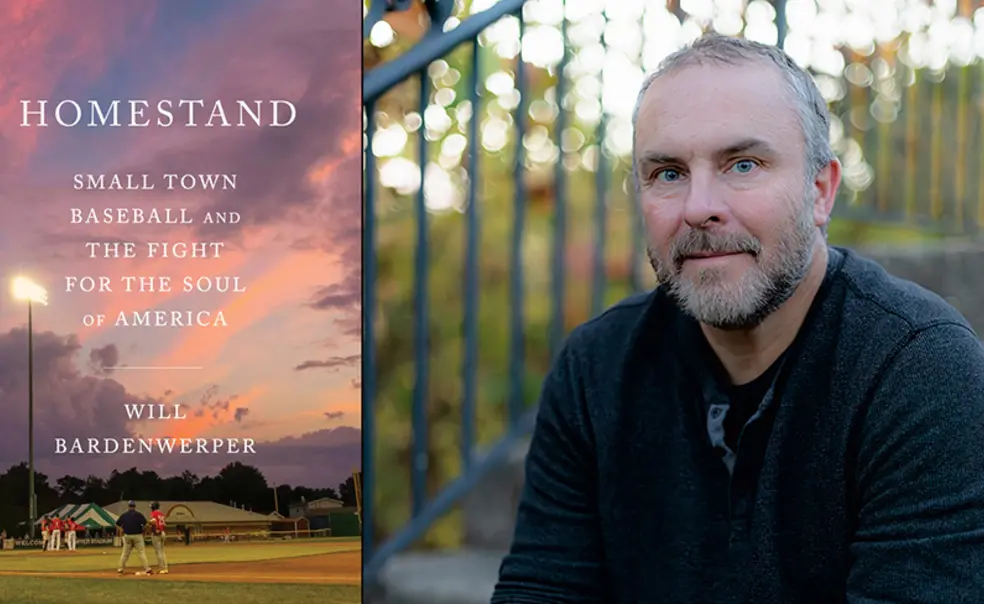Will Bardenwerper ’98 Chronicles a Baseball Rebirth in Western New York
Bardenwerper’s new book is Homestand: Small Town Baseball and the Fight for the Soul of America
Batavia, New York, is a baseball town. For decades, people have flocked to the grandstands of Dwyer Stadium to root for the home team (most recently known as the Muckdogs) and catch up with friends and neighbors — including some who, in other contexts, might have few things in common, says author Will Bardenwerper ’98. “I think we certainly could use more of that in our society,” he says.
In his new book, Homestand: Small Town Baseball and the Fight for the Soul of America, Bardenwerper tells the story of how Batavia lost its minor league team, rallied around the collegiate summer league team that replaced it, and improbably kept a tight-knit community of fans together.
Batavia, about 40 miles east of Buffalo, was part of the New York-Penn League, an A-level minor league affiliated with Major League Baseball, until MLB shrank its minor league system in 2020, eliminating teams in more than 40 small towns around the country.
Bardenwerper, who played two seasons of baseball at Princeton, had closely watched the contraction of the minors, which he says represent the grassroots of baseball fandom. MLB’s business case for the change did not make sense to him: “You might save a few bucks short term, but what’s the long-term damage that you’re doing?”
In 2021, he traveled to Pulaski, Virginia, to find out, writing a story for Harper’s Magazine on the Appalachian League, which had been downgraded to an MLB-sponsored collegiate summer league. That story caught the eye of Bill Kauffman, a longtime Batavia fan, who invited him to meet the people responsible for keeping the Muckdogs on the field. In 2022, Bardenwerper spent much of the summer in Batavia, reporting on the team and the town while also weaving economic and social threads into his story. The games provide part of the narrative structure of Homestand, published by Doubleday in March, but people are the focus. “For every nine-inning game, I probably spent three innings in the dugout and six innings in the stands,” he says. “And that’s kind of the same ratio you’ll find in the book.”
While Bardenwerper explores the communal dynamics at work, he also brings to life the entertainment value of small-town baseball. The Muckdogs’ owners — Robbie Nichols, a former minor-league hockey player, and his wife, Nellie — have carried over some of the hallmarks of the minor league experience, like inviting kids onto the field to run the bases between innings and bringing in local celebrities to throw the ceremonial first pitch (for example, the Onion Queen from the neighboring town of Elba, “Onion Capital of the World”). There’s even a father-son contest sponsored by a local brewery in which the dads chug beers and the kids gulp cups of water.
Bardenwerper, an English major at Princeton, served as Army officer in the Iraq War and wrote his first book, The Prisoner in His Palace, about the American soldiers who guarded Saddam Hussein in the weeks leading up to his execution. He’s also written an Outside magazine feature on Army Ranger School and a PAW essay about journalists’ coverage of the U.S. military. Pivoting to baseball might seem like a big switch, but Homestand fits under the same broad umbrella of understanding often-overlooked aspects of American life — in this case, towns that have lagged in economic growth.
Professional baseball may just be another business leaving small towns for more lucrative markets, but Bardenwerper says that stands in stark contrast with the way MLB portrays itself, through nostalgic displays such as the made-for-TV Field of Dreams game in an Iowa cornfield.
“At the end of the day, my attitude was you can’t have it both ways,” he says. “You know, if you want to cloak yourself in this Norman Rockwell Americana and use that to sell the sport and to sell tickets, OK. But then you can’t make decisions that are just ruthlessly McKinsey-ish and save every last cent at the expense of so many people across the country.”












2 Responses
Vance Steadman
4 Months AgoMinor League Memories
I played for the Batavia Trojans in 1967 as an 18-year-old Phillies prospect in the New York-Penn League. Missed next year due to army. Released 1969 in spring training. Cardinals sent me to Canada in the Provincial League. Played for Sherebrook, Quebec.
I loved the book and had great memories of my time in the minors at Batavia. Now live near Elmira, New York, where I was born and raised. Yes, I went to Dunn Field as a kid as it was the closest ballpark near us.
Thanks for the memories.
Howard Snyder
6 Months AgoElmira’s Collegiate Gem
Dear Will,
I loved Homestand. Thanks so much for this offering to a baseball devotee ... a lifetime fan of the Phillies.
I have just one bone to pick with you. In your incredibly bleak description of the city of Elmira, you failed to mention its one big gem, Elmira College. Both my mother and sister graduated from Elmira and later served on the college’s board of trustees for a number of years. I have been to the campus a number of times and found it to be quite charming, including the special Mark Twain building and other acknowledgements of his presence there.
If you write another book about the Elmira Pioneers and the Batavia Muckdogs, I hope you will say something about Elmira College and its impact on the city of Elmira.
Thank you very much.